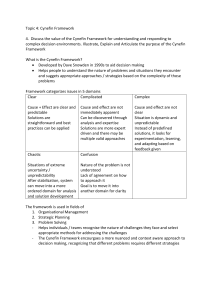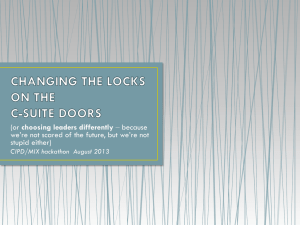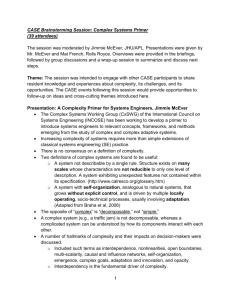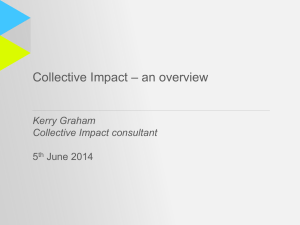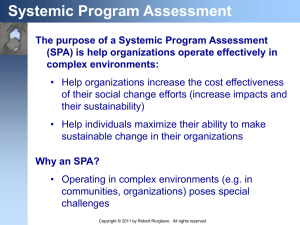The Cynefin Centre for Organisational Complexity
advertisement
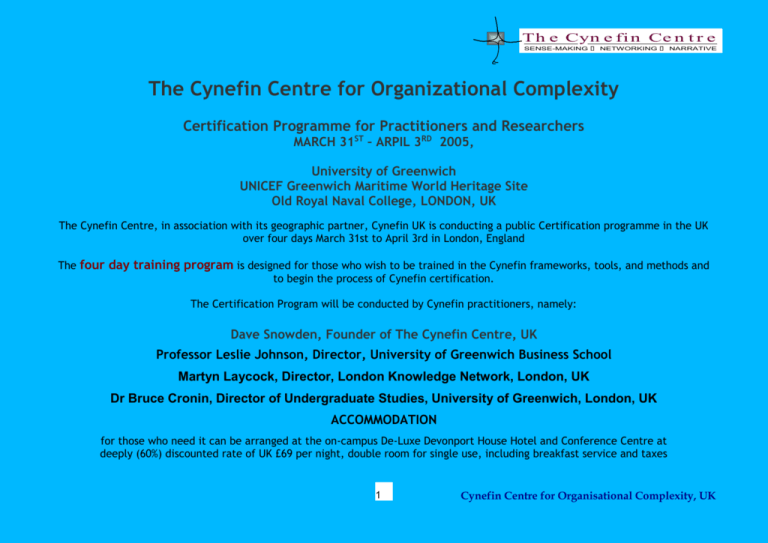
Th e Cyn e fi n Ce n t r e SENSE-MAKING NETWORKING NARRATIVE The Cynefin Centre for Organizational Complexity Certification Programme for Practitioners and Researchers MARCH 31ST – ARPIL 3RD 2005, University of Greenwich UNICEF Greenwich Maritime World Heritage Site Old Royal Naval College, LONDON, UK The Cynefin Centre, in association with its geographic partner, Cynefin UK is conducting a public Certification programme in the UK over four days March 31st to April 3rd in London, England The four day training program is designed for those who wish to be trained in the Cynefin frameworks, tools, and methods and to begin the process of Cynefin certification. The Certification Program will be conducted by Cynefin practitioners, namely: Dave Snowden, Founder of The Cynefin Centre, UK Professor Leslie Johnson, Director, University of Greenwich Business School Martyn Laycock, Director, London Knowledge Network, London, UK Dr Bruce Cronin, Director of Undergraduate Studies, University of Greenwich, London, UK ACCOMMODATION for those who need it can be arranged at the on-campus De-Luxe Devonport House Hotel and Conference Centre at deeply (60%) discounted rate of UK £69 per night, double room for single use, including breakfast service and taxes 1 Cynefin Centre for Organisational Complexity, UK Th e Cyn e fi n Ce n t r e SENSE-MAKING NETWORKING NARRATIVE About The Cynefin Centre The Cynefin Centre leverages an international network that focuses on the application of complexity science to management and organizational practice. The Centre spun off from IBM in July 2004 and is based in a global network of practitioners and academic institutions. At the heart of The Cynefin Centre is a distinction between ordered and unordered systems, and the consequent recognition that systems with fundamentally different qualities require the application of contextually different methods for both diagnosis and intervention. The Cynefin mission is achieved through a three-stage life cycle focused on three application areas. The Cynefin Centre has three interlinked focus areas. SENSE-MAKING: distinguishing different types of systems and SOCIAL COMPLEXITY: applying complexity science to human thereby enabling the appropriate application of methods and tools, relevant to each type. systems. OPEN SOURCE: creating an open source movement for consultancy NETWORKING: understanding issues of human identity and practice and theory based on social complexity. interaction in their natural state and the stimulation of new social networks. DISTRIBUTED RESEARCH: developing trans-disciplinary research based on emergence, participation and co-evolution. NARRATIVE: gathering, interpreting, representing and creating the narrative forms that pattern human interaction. The organizational structure and methods of The Cynefin Centre are based on the principles of social complexity. The Founder and Director, Dave Snowden, is a world-renowned thought leader in both complexity and narrative. The unique approach of The Centre offers practical action research and a powerful blend of fresh new ideas and grounded methods in addressing complex and intractable issues. Dave was formerly a director in the IBM Institute for Knowledge Management, where he led the program on complexity and narrative; his subsequent work has taken him into the integration of learning and knowledge using models derived from complexity science and the development of advanced techniques for the management of informal communities and the simulation of social networks. Program Details : Cynefin Certification Training Course This course is a broad introduction to The Cynefin Centre, its aims and objectives, and the origins of the Cynefin approach, which is based on principles drawn from Complexity Science, Narrative, Cognitive Psychology, and Anthropology. It focuses on the Cynefin methods, practical techniques, and tools that have been developed and used in projects around the world over the last 3 to 5 years. The course highlights the three focus areas of The Cynefin Centre: Sense Making, Networks, and Narrative. 2 Cynefin Centre for Organisational Complexity, UK Th e Cyn e fi n Ce n t r e SENSE-MAKING NETWORKING NARRATIVE Course Content Date and Time Introduction to Cynefin Social Complexity The Cynefin Framework and Principles Cynefin Components: Sense-making, Networks, and Narrative Thursday March 31st 2005 10:00am - 5:30pm 6:30pm – 8:30pm (Working DinnerClinic) Friday April 1st 2005 9:00am – 5:30pm 6:30pm – 8:30pm (Working Dinner/Clinic) Saturday April 2nd 2005 9:00am – 2.30pm 3.00 p.m :Social Program 7.00 p.m : Course Dinner Sunday April 3rd 2005 9.00am – 2.30pm Narrative and its role in Sense-making Facilitating the Emergence of Meaning The Role of Narrative Narrative Enquiry techniques Location Cynefin Sense-making and Intervention Design Sense-making techniques Cynefin interventions University of Greenwich. Old Royal Naval College, London, England Social Network Stimulation Fee Application of Cynefin techniques to business problems Corporate: Independent: Non-profit: If you are facing an intractable business issue on which you would like to obtain a different perspective, you are welcome to bring information Academic: Government: along so we can include it in the evening discussion clinics. Cynefin project assembly development £1,250 tax incl. £1,100 tax incl. £1,000 tax incl. £1,000 tax incl. £1,000 tax incl. Please note that these fees include all course materials, morning and afternoon coffee breaks, lunches, and Course dinner. The fee excludes any accommodation or travel costs that may be incurred in attending the course. 3 Cynefin Centre for Organisational Complexity, UK Th e Cyn e fi n Ce n t r e SENSE-MAKING NETWORKING NARRATIVE Cynefin Certification The sponsoring hub for The Cynefin Centre in the UK is Cynefin UK. Cynefin UK will be the organizer and coordinator of all activities associated with Cynefin certification. Cynefin Certification is an apprenticeship model of knowledge transfer. In keeping with the spirit of Open Source, no restriction is made on certified members using Cynefin methods which are freely published. Undertaking and maintaining certification entitles members to have an entry on the Cynefin Web site, which acknowledges their status, details their experience, and provides a reference point for clients. Certified members will have access to products and programs, regular updates on theory and method, access to communities of practice, and connections to mentors and the global Cynefin network. What does certification involve? 1. For Consultants and Professionals: Completion of a written assessment. The assessment is usually undertaken at the completion of a training program; however anyone can opt to apply to do the assessment at any time. Assessment by a Cynefin assessor of a half-day presentation to a group (who are not familiar with the material) in a workshop format that encompasses an “Introduction to Cynefin.” This may be a student group, a work group, or a client group. You may charge the group for the presentation to cover the cost of the assessor’s time. The associated costs are: Examination assessment £100 tax incl. Presentation assessment £250 tax incl. Written assessments will be provided to candidates and copies forwarded to The Cynefin Centre. Finalizing Certification All members are expected to participate in a supervised project working with a more experienced practitioner. Once the first assignment has been satisfactorily completed and a report posted to the Cynefin Web site, individuals are designated as a Cynefin Member and their name is placed on the Web site. They are given an area of the Web site on which to post their project experiences. Their listing on the Web site will indicate the nature of their membership and experience. Registration cost £100 per annum tax incl. 4 Cynefin Centre for Organisational Complexity, UK Th e Cyn e fi n Ce n t r e SENSE-MAKING NETWORKING NARRATIVE Maintaining Certification To maintain certification, Members are expected to: Repeat the supervised practice at least once a year at a level determined by their mentor. Post their project experiences on the Cynefin Web site and attend upgrade and update programs from time to time. Maintain a workbook (which is open to inspection) of their projects for at least two years, and to post the results of their experience to the Cynefin network for peer review. The workbook comprises the entries linked with the Member’s name on the Web site. It is anticipated that an additional level of certification will be created for those who want to go deeper into the theory behind Cynefin and who practice across the full spectrum of Cynefin techniques. It is planned to link this with a higher education qualification, based on that offered by the Cynefin home institution. 2. For Academics and Researchers It is anticipated that some Cynefin members will specialize in research. Completion of a written assessment. This is usually undertaken at the completion of a training program; however anyone can opt to apply to do the assessment at any time. Assessment by a Cynefin assessor of an initial research proposal. The associated costs are: Examination assessment £100 tax incl. Proposal assessment £100 tax incl. Written assessments will be provided to candidates and copies forwarded to The Cynefin Centre. Finalizing Certification All researchers are expected to participate in a supervised research project working with a more experienced researcher. Once the first assignment has been satisfactorily completed and a report posted to the Cynefin Web site, the individual is designated as a Cynefin Member and their name placed on the Web site. They are given an area of the Web site on which to post their research experiences. Their listing on the Web site will indicate the nature of their membership and experience. Registration cost £100 per annum tax incl. 5 Cynefin Centre for Organisational Complexity, UK Th e Cyn e fi n Ce n t r e SENSE-MAKING NETWORKING NARRATIVE Maintaining Certification To maintain certification, Research and Academic Members will be expected to: Repeat the supervised research at least once a year at a level determined by their mentor. Post their research project experiences on the Cynefin Web site and attend upgrade and update programs from time to time. Maintain a workbook (which is open to inspection) of their research work for at least two years, and post the results of their experience to the Cynefin network for peer review. The workbook comprises the entries linked with the Member’s name on the Web site. It is anticipated that an additional level of certification will be created for those who want to go deeper into the theory behind Cynefin and who practice across the full spectrum of Cynefin techniques. It is planned to link this with a higher education qualification, based on that offered by the Cynefin home institution. 3. For Cynefin Associates Individuals who have been through the Cynefin certification program but have not yet carried out their first assignment, or who wish to be partnered with The Centre in some other way, are designated as Cynefin Associates. The registration charge per annum is £100 tax incl. FOR FURTHER INFORMATION, PLEASE CONTACT Martyn Laycock martyn@managingtransitions.net 6 44 (0) 7974722001 Cynefin Centre for Organisational Complexity, UK Th e Cyn e fi n Ce n t r e SENSE-MAKING NETWORKING NARRATIVE Preparing for the Programme Once registration is received, we will send you a pre-reading package. Working through this is strongly advised, as it represents an excellent way to prepare for the course. The following books are also useful. If you happen to have them, then it’s worth a refresh. Axelrod, R. and Cohen, M. (1999) Harnessing Complexity: Organizational Implications of a Scientific Frontier, New York: The Free Press. Boisot, M. Knowledge Assets, Oxford 1998. Clark, A. (1997) Being There: Putting Brain, Body, and the World Together Again, MIT. Deacon, Terrence (1997). The Symbolic Species, Penguin. Dervin, B. “Sense Making theory and practice: an overview of user interests in knowledge seeking and use” Knowledge Management 2:2 MCB University Press, December 1998. Gabriel, Yiannis (2000) Story Telling in Organisations: Facts Fictions, and Fantasies, Oxford. Johnson, S (2001) Emergence, Penguin. Juarrero, A (1999) Dynamics in Action: Intentional Behaviour as a Complex System, MIT Press. Klein, G. (1944) Sources of power: how people make decisions, MIT. McKee, Robert. Story. Polanyi (1962) Terry Lectures at Yale University, republished in 1983 by Doubleday & Company as The Tacit Dimension ISBN 0-8446 5999-1. Shah, Idries The Exploits of the Incomparable Mulla Nasrudin & the Subtleties of the Inimitable Mulla Nasrudin, [double volume] Octagon Press, London 1985. Stacey, R. (2001) Complex responsive processes in organizations: learning and knowledge creation, Routledge. Weissman, D. (2000) “A Social Ontology”, Yale University. 7 Cynefin Centre for Organisational Complexity, UK
